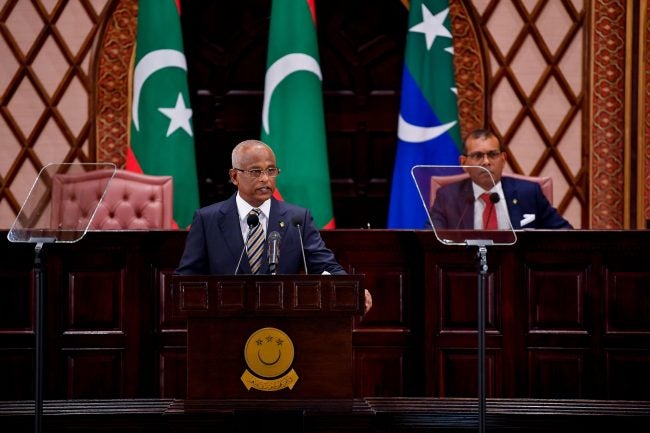‘India Out’ Protests in the Maldives: Legislation Not a Desirable Solution
Amit Ranjan
8 February 2022Summary
The Maldivian Democratic Party (MDP) has drafted a bill to curb the ‘India Out’ campaign in the Maldives. This legislation is undemocratic and may revert the country to the days of Abdulla Yameen’s presidency. Even some members of the MDP find the provisions in the draft “extreme” and fear a political backlash. The government is yet to say anything about the draft bill.
According to Indian and Maldivian media reports, the ruling Maldivian Democratic Party (MDP) has drafted a bill termed ‘The Bill To Stop All Actions That Could Negatively Effect Relations Established By The Maldives With Foreign Countries‘, and shared it with the party’s parliamentarians. The text of the draft, as The Maldives Journal reports, states that its primary “objective is to hinder and stop any actions that could have a negative effect on the Maldives’ relations with foreign countries.”
The bill criminalises demonstrations avowing the island state is under “the dominion of a foreign country or that its sovereignty and independence are controlled by the military, political and economic means of a foreign country.” The draft bill suggests that anyone violating the law could be punished with a fine of MVR20,000 (S$1,742), imprisonment for six months or house arrest for one year. The Maldives Journal adds that the MDP began drafting the bill after the Indian government asked the Maldivian government to put an end to the ‘India Out’ movement.
The interest of the government in the draft bill is unclear. There has been no formal discussion on the bill between the party and the government. If the bill is introduced in parliament, it will be easily passed, as the MDP has 65 members in the 87-member house. Some of the MDP members are, however, cautious about the “extreme” provisions in the draft, which are a “violation of democratic norms”, and “fear a backlash”. They also believe that the present text of the draft would not be acceptable to most of the MDP members.
Reacting to the draft, the opposition – the Progressive Coalition Congress – issued a statement in which it “strongly condemn(ed) their current efforts to draft and pass a law aiming to suppress the legitimate public concerns surrounding President Ibrahim Mohamed Solih’s collusion with the Indian government and the subsequent stationing of Indian military forces in the Maldives.” The statement also called the current government authoritarian and blamed it for taking undemocratic steps to muzzle the free voices and curtail the freedom of the people.
Traditionally, India has been an important partner and net security provider to the Maldives. New Delhi’s role has been recognised by all Maldivian presidents except Abdulla Yameen (2013-2018) and his predecessor Mohammed Waheed Hassan (2012-2013), who tried to change the country’s approach towards India. To India’s dismay, Malé, particularly under Yameen, moved closer to Beijing. After being elected in 2018, Solih, a founding member of the MDP, reviewed the country’s relations with Beijing and reaffirmed the ‘India First’ policy, again strengthening ties with New Delhi.
The ‘India Out’ campaign is led by Yameen, who is regarded by many in the Maldives as a ‘pro-China’ leader. Supporters of the campaign accuse Solih’s government of “selling off the Maldives” to India. They decry the presence of Indian army personnel in the island country and accuse the government of compromising the Maldives’ sovereignty. The Maldivian National Defence, the government and the MDP have refuted such accusations. Correspondingly, critics of the ‘India Out’ campaign have accused the protestors of being funded by China, a claim which Beijing has denied.
The ‘India Out’ campaigners are active on social media and have been organising rallies across the country. In the past, they were even accused of harassing the Indians in the Maldives. For instance, in January 2022, two cases of harassment of Indian teachers by the ‘India Out’ protestors were reported and confirmed by the Maldives’ education ministry.
Despite the growing political clout of the ‘India Out’ campaigners, a law to curb the protests in the Maldives at the time of ‘democratic recession’ across Asia is not a wise move. It would provide the political space for authoritarianism. Instead of instating the law, it is better to enter into a dialogue with the leaders of the ‘India Out’ campaign. Should the leaders of the campaign refuse to change their position, the Maldivian government and the Indian High Commission in Malé could take recourse by reaching out to citizens to convince them about what New Delhi’s projects in the country aim to achieve. The MDP may also use its political machinery to provide a suitable democratic response to the questions raised by the ‘India Out’ campaigners.
Before pushing through any such law, it would do good for the MDP to recall the difficult years under Yameen’s presidency, during which critics and the media were silenced and all dissenting voices from various institutions, including the Supreme Court, were purged. Many members of the MDP and human rights activists were politically targeted and subjected to unlawful punishment. Solih was elected as president to get rid of these undemocratic practices and do away with the gross abuse of political power by the Yameen government. The current administration certainly would not want to be accused of returning the Maldives to that era.
. . . . .
Dr Amit Ranjan is a Research Fellow at the Institute of South Asian Studies (ISAS), an autonomous research institute at the National University of Singapore (NUS). He can be contacted at isasar@nus.edu.sg. The author bears full responsibility for the facts cited and opinions expressed in this paper.
Photo Credit: President’s Office of Republic of Maldives (Attribution 4.0 International License)
-
 More From :
More From :
-
 Tags :
Tags :
-
 Download PDF
Download PDF



